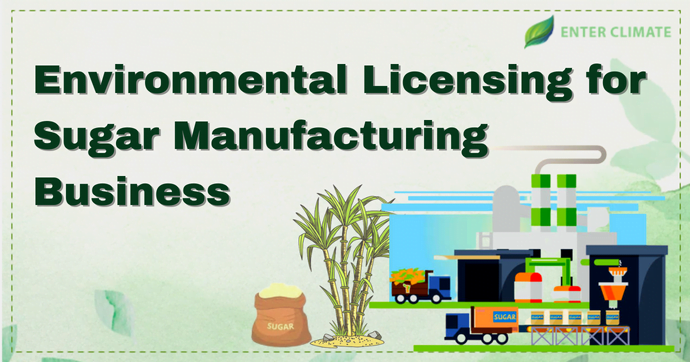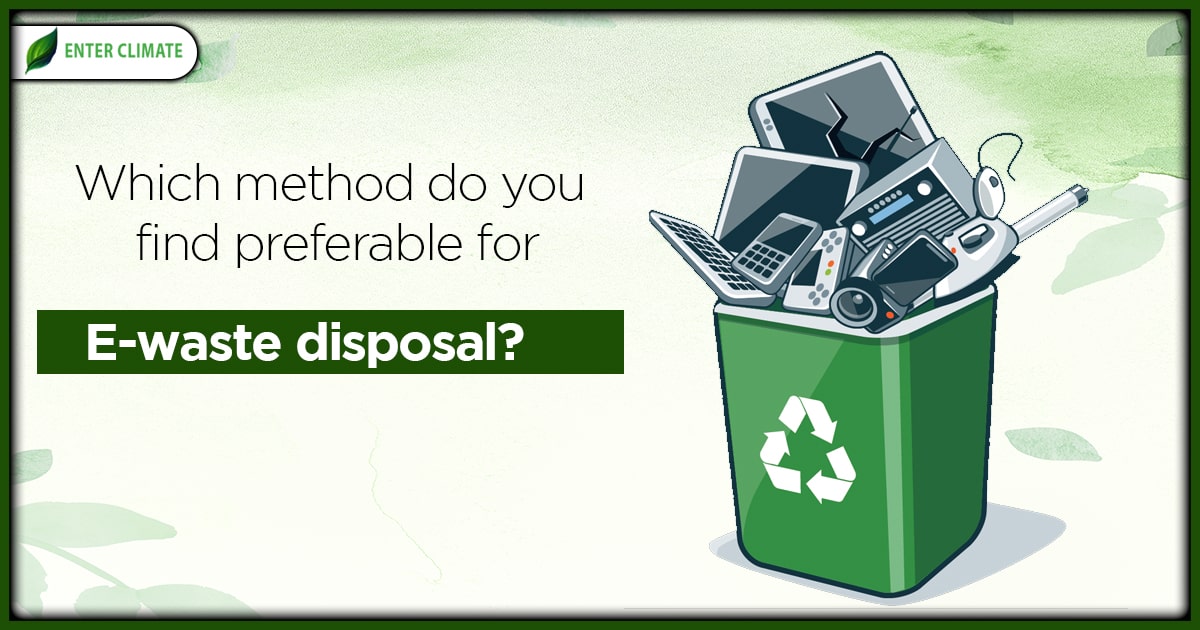Environmental Licensing for Sugar Manufacturing Business
 29 Sep, 2022
29 Sep, 2022 
Sugar is one of the basic necessities that is found in every kitchen and has a large number of consumers. It is extracted from two different raw materials, sugar cane and beet. In India, the majority of sugar production is done using sugar cane as a raw material. In the year 2021, the overall market for industrially produced sugar was worth 37.62 Billion US Dollars, with the potential to reach 46.56 Billion US Dollars at a Compound Annual Growth Rate (CAGR) of 2.72 per cent. This blog will highlight the environmental licenses required by the Sugar Manufacturing Business and the process of acquiring them.
Process followed in Sugar Manufacturing Business
The process followed in the Sugar Manufacturing Business includes the following steps: –
- Harvesting
- Washing and initial preparation
- Juice extraction
- Purification of juice
- Crystallisation
- Centrifugation
- Drying and packaging
Present scenario of sugar production in India
According to the latest reports, India is the second largest sugar producer, with Brazil being the largest. The top ten countries that are the largest producers of sugar worldwide are given below: –
|
S.No. |
Countries |
Amount (in MMT) |
|
1. |
Brazil |
37,300,000 |
|
2. |
India |
26,605,000 |
|
3. |
China |
11,474,000 |
|
4. |
Thailand |
10,024,000 |
|
5. |
United States |
7,666,000 |
|
6. |
Pakistan |
6,103,000 |
|
7. |
Mexico |
6,021,292 |
|
8. |
Russia |
5,249,339 |
|
9. |
France |
4,692,000 |
|
10. |
Australia |
4,364,000 |
|
Sr.No. |
States |
|
1. |
Uttar Pradesh |
|
2. |
Maharashtra |
|
3. |
Tamil Nadu |
|
4. |
Karnataka |
|
5. |
Andhra Pradesh |
|
6. |
Bihar |
|
7. |
Gujrat |
|
8. |
Haryana |
|
9. |
Punjab |
|
10. |
Uttarakhand |
Market overview of the Sugar Manufacturing Business
According to the Sugar and Sugar Cane Policy on the official portal of the Ministry of Consumer Affairs, Food and Public Distribution, there are 732 installed sugar factories in India. These units have a manufacturing capacity to produce around 339 lakh MT of sugar. This indicates the vast scope of the sugar manufacturing business in India.
The cane sugar market in India is estimated to reach a CAGR of 5.2 per cent during the prediction period of 2022-2027. India’s organic sugar export rose 20% to an all-time high of 7.1 million tonnes in the 2020-21 marketing year ended last month due to better demand and financial assistance from the government. In the year 2021, the overall market for industrially produced sugar was worth 37.62 Billion US Dollars, with the potential to reach 46.56 Billion US Dollars at a CAGR of 2.72 per cent.
Sugar has become one of the indispensable food consumption items generally, particularly in urban areas. The future of the sugar manufacturing business is projected to surge considerably, given the current demand for the domestic market.
Additionally, sugar is an essential component in many processed food industries. Sugar also has a massive demand in the market, representing the export business. Some of the leading sugar importing countries are Bangladesh, Indonesia, the United Arab Emirates, China, the European Union, the United States, etc.
Financial breakups for Sugar Manufacturing Business
Further, while setting up Sugar Manufacturing Business, the owner must also keep in mind the financial breakup of the establishment. The breakup is divided into two types of expenses: Fixed capital expenses and working capital investments.
Fixed Capital Expenses
- Expense of land
- Setup cost
- Cost of manufacturing plant
- Procuring machinery
- Licensing
- Registration
- Permissions
Working Capital Investments
- Salaries
- Transportation
- Scrap cost
- Utility expenses such as electricity and water
- Logistics expenses
- Spares and consumables
- Contingency expenses
Machinery or equipment required for Sugar Manufacturing Business
The milling of sugar is an integrated process that comprises several machines working at a particular time. Some of the important machines that are required for the Sugar Manufacturing Business are: –
- Knives
- Boilers
- Washers
- Shredders
- Tanks
- Mills tandem
- Decanters
- Vacuum filters
- Vacuum evaporators
- Heat exchangers
- Vacuum pans
- Crystallizers
- Fermentation tanks
- Centrifuges
- Pumps
- Column still
- Electricity generators
- Molasses tanks
- Driers
- Fork lifters
- Alcohol tanks
Environmental Compliances
The sugar manufacturing business has to adhere to environmental compliances governed by the Ministry of Environment, Forest and Climate Change (MoEF&CC). This has to be done in addition to obtaining general business licenses to show commitment to the environment and circular economy.
Consent Certificates
CTE (Consent to Establish) is acquired by the owner of the sugar manufacturing business before the unit is established under the Air and Water (Prevention and Control of Pollution) Acts.
CTO (Consent to Operate) is acquired by the owner after the business is established and is ready to start manufacturing under the Air and Water (Prevention and Control of Pollution) Acts.
Moreover, the process for both the Consent Certificates is identical. According to the process, the authorisation form is submitted via the online portal of the concerned UT Pollution Control Committee (PCC)/the State Pollution Control Board (SPCB) with the required documents. Subsequently, the application is reviewed. Once the documents are analysed, in the case of Consent to Operate, a government official of state authorities conducts a site inspection and makes the report accordingly. Upon report inspection, the consent certificate is granted.
Documents required for Consent to Establish
For acquiring Consent to Establish from the SPCB/PCCfor Sugar Manufacturing Business, the manufacturer has to submit the following documents: –
- Documents relating to land registration, including registration/lease or sale deed
- A complete project report is a must for Consent to Establish. The report comprises an economic breakdown related to a flow chart of the procedure, break up of land used, pollution control measures, industrial process and control equipment relating to air pollution, details for ETP, production of wastewater and Solid Waste Management.
- Layout/Site plan
- GST certificate
- Aadhaar card
- Copy of self-declaration form for restriction of Hazardous Waste
Documents required under Consent to Operate
To acquire Consent to Operate in the sugar manufacturing business, the manufacturer has to submit the following documents –
- Electricity bill
- PAN card
- Water bill
- Aadhaar card
- Municipality/Industry license for trading business
- CA letter on the financial breakup
- Proof of ownership, including rent agreement/lease agreement
- Health Trade License
- Site Plan/layout
- Form V as mandated by Rule 14 of the Environmental (Protection) Act
- Goods and Services Tax certificate
- Proof of registration of unit under Companies Act/LLP Act[1]
- Authorisation letter
- Factory or Trade license
- Consent to Establish certificate
General Business Setup Licenses
To fulfil the environmental compliances, the owner of a sugar manufacturing business has to acquire general licenses and authorisation from the respective governmental authorities. Some of these licenses are: –
Company license
Documents required for establishing the company
- PAN card
- Address proof such as
- Electricity bill
- Ration card
- Passport
- Aadhaar card
- Election card or Voter Identity card
- Driving license
- Telephone bill
- Residential proof such as
- Electricity bill
- Bank statement
- Telephone bill
- Mobile bill
- MOA (Memorandum of Association)
- GST registration certificate
- AOA (Article of Association)
FSSAI Food Business License
For operating a sugar manufacturing business, the owner is required to obtain the FSSAI Food Business license prescribed by Food Safety and Standard Act. This license is usually provided for one year.
Documents required for FSSAI Food Business License
- Passport photo
- Address proof
- List of food categories
- Photo Id proof
- Blueprint/Layout plan
- List of equipment
- NOC from Municipality
- Incorporation Certificate
- List of directors/partners
- MOA and AOA
- Water test report
- Import Export Code (IEC)
Udyam MSME Registration
The Ministry of Micro, Small and Medium Enterprise(MSME) is the regulating authority for granting MSME registration. The owner of a sugar manufacturing business has to apply through the centralised online portal of the authority and submit the stipulated documents.
Documents needed for MSME registration
- Applicant’sofficial name
- Name and type of enterprise
- Aadhaar card
- PAN card
- The NIC Code
- Account details
- The social category of the applicant
- The business operations of the enterprise
- Date of incorporation of a business
- Details related to employment
Factory license acquired by Sugar Manufacturing Business
To establish the unit, the sugar manufacturing business owner must list the business under Factories Act. As per the Act, processors are mandated to get a factory license, which the Chief Inspector of the Labour Commissioner Organisation approves after examining the manufacturing site.
Documents needed by the owner of the Sugar Manufacturing Business
For the factory license, the owner of the sugar manufacturing business requires the following documents: –
- Form 1
- MOA
- Aadhaar card
- Layout/site plan
- List of directors
- AOA
- Partnership deed
- Account details
- Commencement date
- Payment receipt
- Land deeds
- Consent form from SPCB/PCC
- Details of hazardous and non-hazardous waste
- Tax receipt
Import Export Code Registration for India
The import and export code (IEC) is the ten-digit code that every exporter and importer must acquire from the Ministry of Commerce. IEC is authorised by the DGFT (Director-General of Foreign Trade). One of the other exclusive characteristics of this code is that IEC is a one-time authorisation that does not need renewal.
The registration application for the code for a sugar manufacturing business must be submitted online with the DSC (Digital Signature Certificate). Additionally, the application must be accompanied by authorised documents and bank details. The authorities then approve these, after which a soft copy of the code is generated for trading.
Documents Required
The Ministry of Commerce mandates the following documents for an IEC registration –
- PAN card of the company
- Applicant’s PAN
- Aadhaar card
- Company Incorporation Certificate or partnership deed
- Address proof
- Copy of cancelled cheque leaf/banker certificate of the current account in the company name
Fire NOC
The fire No Objection Certificate (NOC) is mandatory for the sugar manufacturing business. The NOC is granted by the Local Municipality Authority and regulated by State Government. Obtaining fire NOC involves applying with the mandated documents. The application is then forwarded to the Chief Officer of the Fire Service Department, who further inspects the manufacturing site. After the inspection is concluded, the report is framed and submitted to the department, which grants a No Objection Certificate on further examination.
Documents required for fire NOC for Sugar Manufacturing Business
- Site plan
- Basement floor plan
- Stilt/ground floor plan
- Floor-wise plan
- Terrace plan
- Section plan
- Elevation plan
- Any other supporting records related to the above documents
GST Certificate
Document required for GST Certificate for establishing Sugar Manufacturing Business
- PAN card
- The Ministry of Corporate Affairs authorised Incorporation Certificate
- MOA
- AOA
- Aadhaar card of the applicant
- Address proof
- Bank details
Trade license needed by Sugar Manufacturing Business
A trade license for a sugar manufacturing business is granted by the Municipal Corporation and depends on the rules and norms set by the respective state. The documents/licenses needed for trade licenses are submitted along with the registration application.
Documents/licenses needed for trade license for Sugar Manufacturing Business
- Aadhaar card
- Address proof (electricity or water bill)
- PAN card
- Certification of Incorporation (CIN) in case of companies
- Memorandum of Association (MOA)
- A latest municipal property tax receipt in case the land of the sugar manufacturing business is owned, else lease document or consent letter of the owner of the property where the business is registered.
- NOC of the neighbours (nearby property owners)
- Layout/site plan of the office
Conclusion
The sugar manufacturing business in India has always been a lucrative option. This is especially true now with the increasing demand for sugar and products with sugar as their main ingredients. Furthermore, to maintain the revenue flow, the government also provides many incentives for small-scale business growth. This is done by adhering to the manufacturer’s requirement to acquire various environmental licenses and authorisations, as stated above.












